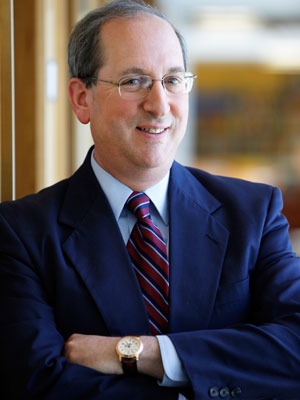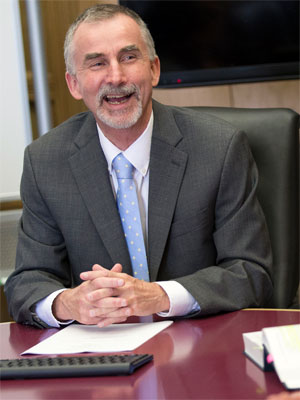 Yale Law School Senior Research Scholar Frederick M. Lawrence will help NIU kick off a new series of Diversity Dialogues that will provide a space for members of the university community to talk openly and honestly on complex and important matters.
Yale Law School Senior Research Scholar Frederick M. Lawrence will help NIU kick off a new series of Diversity Dialogues that will provide a space for members of the university community to talk openly and honestly on complex and important matters.
Sponsored by NIU, the Office of the Executive Vice President and Provost and the City of DeKalb Human Relations Commission, “The First Amendment, Free Speech and Lawful Assembly” is scheduled for 6:30 to 8:30 p.m. Wednesday, March 23, in the Carl Sandburg Auditorium of the Holmes Student Center.
Mark W. Cordes, interim dean of the NIU College of Law, and students Ariel Owens and Timothy Brandner will join Lawrence on the panel. NIU Law professor Yolanda M. King will moderate.
The event is free and open to the public.
“We still have people and groups that have reservations about talking openly about diversity topics,” said Vernese Edghill-Walden, senior associate vice president for Academic Diversity and chief diversity officer.
“Our hope is that we will begin a conversation that will inform how we should create a civil community as well as provide insight on how we should move forward together,” Edghill-Walden added. “The overarching theme for all of these discussions is intersectionality, looking at how one diversity area intersects with the others.”
Panelists at the inaugural event will explore questions of why free speech and the right to peacefully assemble are important at NIU or any college campus – places where people of different cultural backgrounds and beliefs come together to learn.
Among the many reasons: engaging in debates and the exercise of First Amendment rights gives students an opportunity to shape public policy and actively engage in conversations nationally.
Student activism during the 1950s and ’60s impacted the military draft and the debate over the war itself. It sparked conversations on violence toward, and unfair treatment against minorities and women.
“If free speech should flourish anywhere,” Lawrence said, “it is within the halls of the university.”
Lawrence, a former president of Brandeis University who has moderated several panel discussions on free speech, has taught classes on subjects such as civil rights enforcement, criminal law, civil law and the First Amendment.
During his tenure at Brandeis, he supported a campus commitment to free speech: Because the university was named after a pro-speech Supreme Court justice, he forwarded Louis Brandeis’ initiatives by hosting a semester-long series that explored the legacy of free speech.
NIU President Doug Baker, who asked Edghill-Walden to launch the ongoing series of dialogues, said the series of discussions “reinforce our commitment to creating a rich learning environment for all of our members.”
That work is well under way, he said, thanks to members of the Diversity and Inclusion Task Force who “created a strong report on the actions needed to improve key dimensions of our environment.”
When people “share perspectives on these difficult issues,” Baker added, they will “build a common understanding that will strengthen the foundation for real and positive change.”
“Diversity and inclusion are core values of NIU. They are among our greatest strengths and provide a dimension of excellence,” the president said. “Our goal as a university is to prepare students for life and careers in a diverse society where cultural competence will be key to their success.”
Free speech is a good place to start, he said: “Sometimes people will be exposed to ideas and perspectives with which they may not agree.”
“The ability of every individual to speak about things they care about is the backbone of a free society,” he said. “At NIU, we take this commitment of free speech seriously. When we find speech to be hurtful and offensive, our response should be to speak out and educate the speaker that there’s another point of view, do that in a respectful way and do it in a way others can hear.”
“Free speech and assembly is fundamental to our value system, partly because of the critical role in plays in our democratic process and the pursuit of truth,” Cordes said. “Beyond that, free speech and debate provides an opportunity to challenge conventional ideas and institutions, and in doing so potentially helps us grow both as individuals and as a society.”
A group of students, faculty and staff worked to pick the topics for the dialogues, which will continue Thursday, April 21, with an exploration of interfaith and how interfaith need not interfere with an ally system within diverse groups.
Upcoming dialogues, which will resume in September, will examine gender inequality and sexual misconduct; structural oppression, structural racism and racial reconciliation; and defining “inclusiveness” at NIU.
Edghill-Walden is hoping that large audiences with a wide range of backgrounds and experience will attend the monthly events.
A broad cross-section of participants from campus and beyond will move the exchange of beliefs and ideas regarding diversity from kitchen tables to across neighborhoods and communities, she said. “We want to go ‘beyond the choir.’ We’re always preaching to the choir,” she said.
“We really want people we don’t always hear from to come and be a part of the conversation. Different perspectives allow us to learn from each other,” she added. “Once we understand things from a different perspective – once we can understand things from someone else’s shoes –we have a better opportunity to build a more inclusive and more respectful environment.”
Discussion will continue online for one month after each event; moderators of that web-based space also will answer questions that came up during the dialogues but were left unresolved.
For more information, call (815) 753-9400 or email ewright1@niu.edu.


